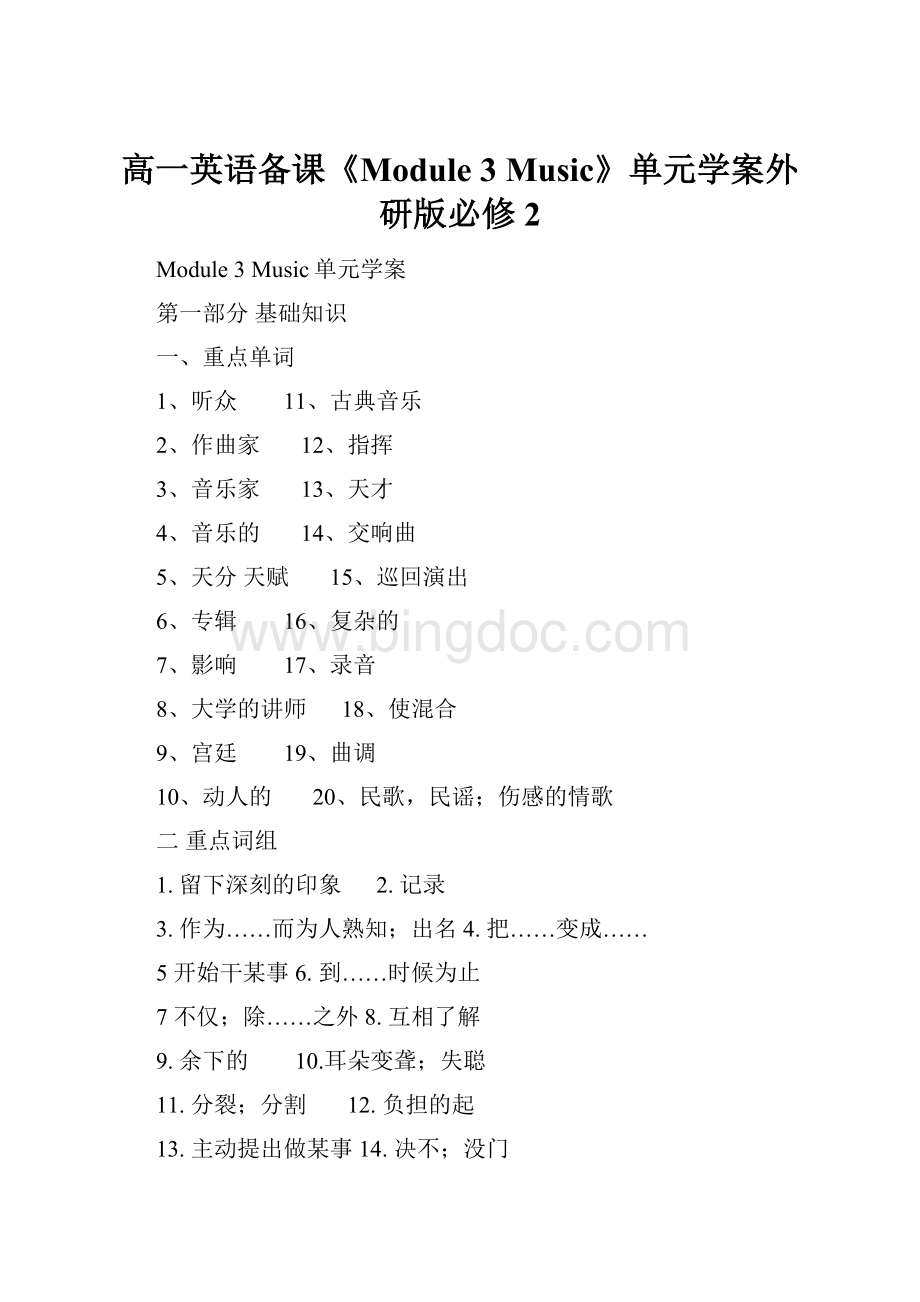高一英语备课《Module 3 Music》单元学案外研版必修2.docx
《高一英语备课《Module 3 Music》单元学案外研版必修2.docx》由会员分享,可在线阅读,更多相关《高一英语备课《Module 3 Music》单元学案外研版必修2.docx(14页珍藏版)》请在冰点文库上搜索。

高一英语备课《Module3Music》单元学案外研版必修2
Module3Music单元学案
第一部分基础知识
一、重点单词
1、听众11、古典音乐
2、作曲家12、指挥
3、音乐家13、天才
4、音乐的14、交响曲
5、天分天赋15、巡回演出
6、专辑16、复杂的
7、影响17、录音
8、大学的讲师18、使混合
9、宫廷19、曲调
10、动人的20、民歌,民谣;伤感的情歌
二重点词组
1.留下深刻的印象2.记录
3.作为……而为人熟知;出名4.把……变成……
5开始干某事6.到……时候为止
7不仅;除……之外8.互相了解
9.余下的10.耳朵变聋;失聪
11.分裂;分割12.负担的起
13.主动提出做某事14.决不;没门
15.有……天赋16.保持纪录
17.由……组成18.与谋事有关联
三本模块重点句型(必背句子)
1. Havingworkedtherefor30years,HaydonmovedtoLondon,wherehewasverysuccessful.
在那里工作了30年后,海顿移居伦敦,在伦敦他非常成功。
Movetoaplace搬家至某地
Havingworked…为现在分词的完成式作时间状语,表示动作发生在主动词之前。
如:
Havinglivedthereforyears,hegotusedtothelifethere.
注意:
现在分词的否定是在分词前否定,如:
Nothavingheardfromherparents,shedecidedtowriteagain.
Verb+ing称为现在分词的一般式,也可作状语,现在分词的一般式表示的时间概念与主动词同时发生或几乎同时发生。
如:
Walkingthroughthestreets,hecaughtsightofatailor’sshop.相当于When/Whilehewaswalkingthroughthestreet…(动作与主动词同时发生)
Hearingthenews,hejumpedupwithjoy.相当于Assoonasheheardthenews…(动作与主动词几乎同时发生)
2. AfterstudyingmusicinVienna,HaydnwenttoworkatthecourtofaprinceineasternAustria,wherehebecamedirectorofmusic.在维也纳学习音乐之后,海顿去奥地利东部一个王子的宫廷工作。
在那里他成了音乐指挥家。
AfterstudyingmusicinVienna是介词短语,用作状语,表示时间.因为after用作介词,所以后面要接v.-ing形式.这一部分可以改写为:
afterhestudiedmusicinVienna
Aftergraduating,shewenttoNewYork.
Beforeleaving,thegaveusaperformance.离开前,他们为我们进行了表演。
3.Bythetimehewas14,Mozarthadcomposedmanypiecesfortheharpsichord,pianoandviolin,aswellasfororchestras.莫扎特到14岁的时候,不仅已经谱写了许多管弦乐曲,还谱写了许多拨弦键琴曲、钢琴曲和小提琴曲。
Aswellas不仅,相当于notonly,如:
Heiscourageousaswellasstrong..相当于Heisnotonlystrongbutalsocourageous.
Theeditorsaswellastheproofreadersareworkingovertime.相当于Notonlytheproofreadersbutalsotheeditorsareworkingovertime.
Bythetime“在……之前,到……为止”引导的时间状语从句。
从句中如果用一般过去时,则主句用过去完成时;从句中如果用一般现在时,则主句用将来完成时.
Bythetimehewas14,hehadbuiltalabofhisown.
Bythetimetheletterreachesyou,Iwillhaveleftthecountry.
4.HaydnmetMozartin1781andwasveryimpressedwithhim.
海顿在1781年与莫扎特相遇,并对他留下了深刻的印象。
Beimpressedwith…对……留下印象。
也可以用beimpressedby\at…如:
Iwasdeeplyimpressedby/with/athisspeech.
Impress的其他用法:
1) Impresssthupon/onsb或者impresssbwithsth使某人铭记某事物。
如:
Myfatherimpressedonmetheimportanceofwork.或者Myfatherimpressedmewiththeimportanceofwork.
2) impresssthupon/onsth在某物上面印上某物。
如:
Heimpressedhisnameonthebox.
5.HoweveritwasHaydnwhoencouragedBeethoventomovetoVienna.
然而,是海顿鼓励贝多芬移居维也纳的。
“Itwas…who…”是强调句,该句强调了主语,正常的语序为“HaydnencouragedBeethoventomovetoVienna.
强调句的基本句型:
Itis/was+被强调部分+that(who)…强调句型用来强调谓语动词以外的任何句子成分。
当被强调部分是人时也可以用who。
(1) ItwasyesterdaythatImetMaryattherailwaystation.
(2) 强调句的一般疑问句型
Is/Was+it+所强调的成分+that/who/whom…?
WasityouthatmetMaryattherailwaystationyesterday?
(3) 强调句的特殊疑问句型
疑问词+is/was+it+that/who/whom…?
WhomwasitthatImetattherailwaystationyesterday?
Whenwasitthathechangedhismindtotakepartintheactivity?
(4)在强调not…until结构时必须把not与until一起放到被强调的位置上
例ItwasnotuntilshetookoffherdarkglassesthatIrealizedshewasmybrother.
(5)注意强调句型与定语从句的区别
例Itwasat7o'clockthathecamehereyesterday.(强调句型)
Itwas7o'clockwhenhecamehereyesterday.(定语从句)
6.BeethovenbecameverypopularintheAustriancapitalandstayedtherefortherestofhislife.
贝多芬在奥地利首都很受欢迎,并在那里度过了余生。
7.Ashegrewolder,hebegantogodeaf.随着年龄的增长,他的耳朵变聋了。
8.JosephHaydnwasanAustriancomposerandisknowas“thefatherofsymphony”.
约瑟夫、海顿(1732—1809),是奥地利作曲家,以“交响乐之父”著称。
四语法
语法一、时间状语从句
时间状语从句主要用于说明主句动词的时间,其类型颇多详见如下归纳。
1. When引导的时间状语从句,意为“当……的时候”,when的从句可以用延续性动词。
HewasworkingatthetablewhenIwentin.当我进去的时候,她正在桌旁工作。
IwaswatchingTVwhenhecame.他来的时候我正在看电视。
注意:
when也可以作并列连词,表示一个动作即将或正在进行或刚完成的时候,突然发生了另一件事。
Iwasabouttoleavewhenthetelephonerang.我正要离开,这是电话铃响了。
Wewereworkinginthechemistrylab,whenthelightswentout.
我们正在化学实验室工作,突然灯熄灭了。
Ihadjustgonetosleepwhentherewasaknockatthedoor..我刚入睡就有人敲门
2. While引导的时间状语从句,表示“与……同时,在……期间”。
While的从句中常用延续性动词或表示状态的词。
Theyrushedinwhilewewerediscussingproblems.当我们正在讨论问题时,他们冲了进来。
FatherwascleaningthecarwhileIwasplayingcomputergames.
当我正在玩电子游戏时,爸爸在清洗汽车。
注意:
while还可以表示对比意义,意为“而;却”。
例如:
Janewasdressedinblue,whileMarywasdressedinred.
珍妮穿着蓝色的衣服,而玛丽穿红色的。
3. As引导的时间状语从句,作“当……的时候,一边……一边”“随着----”解,as的从句中可使用延续性动词,也可使用非延续性动词。
例如:
Hesangashewasworking.他一边工作一边唱歌。
Astimegoesby,wehaveabetterunderstandingofthingsaroundus.
随着时间的推移,我们对自己周围的事务有了更好的理解。
4.Before和after引导的从句:
前者一边表示主句的动作发生早从句的动作之前;后者表示主句的动作发生在从句的动作之后。
例如:
Ididn’tknowanyEnglishbeforeIstartedschool.我上学之前,一点英语都不懂
Ihadcookedsupperbeforemyparentscameback.我父母回来之前,我就做好了晚饭。
Itwon’tbelongbeforewemeetagain.我们不久就能见面。
Afterhecameout,helockedthedoor.他出来后,就锁上了门。
5. Since和eversince引导的从句:
表示“自从……以来”,从句一般表示动作的起点,用过去时。
主句表示动作延续的情况,一般用现在完成时或现在完成进行时。
如果主句表示的是时间,主句可用一边现在时,也可用现在完成时。
现在完成时(延续性动词)…since+…过去时(非延续性动词)“自从……以来”
现在完成时(延续性动词)…since+…过去时(延续性动词)“自(延续性动词结束以来……”
Sincehecamehere,hehasmadealotoffriends.他来这里以后,已交了许多朋友。
Hehasbeenworkinghereeversinceheleftuniversity.
自从大学毕业以后,他就一直在这里工作。
Shehaslivedalonesinceherhusbanddied.自丈夫去世后她就一直独自生活。
IhavebeenwearingglassessinceIwasthree.我三岁以后一直戴眼镜。
Itistenyearssincehesmoked.他戒烟十年了
语法二过去完成时
过去完成时由助动词had加过去分词构成,主要表示在过去某时之前已发生的动作或情况,也可以说时“过去时间的过去”。
其被动形式为“had+been+p.p”例如:
Bytheendoflastterm,wehadlearnedmorethan3,000Englishwords.
到上个学期末为止我们已经学了3000多个单词了。
在包含when,assoonas,before,after,until,nowthat等从属连词引导的主从复合句中,如果主句的谓语和从句的谓语表示的过去动作时在不同的时间发生的话,那么首先发生的动作通常需用过去完成时表示,而发生在后面的动作通常用一般过去时表示;这也可以说时“过去动作的过去”。
例如:
HardlyhadIgothomewhenitbegantorain.我刚一到家,天就开始下雨了。
Tomhadpressedthebuttononthecomputerbeforewecouldstophim.
我们还没来得及阻止他,汤姆就已经按上了电脑上的按钮
注意:
如果句中出现了表示过去的具体时间状语,句子的内容可为过去的实际情况或句子中的内容为历史事实时,句中的动词时态只能用一般过去时。
例如:
TheteachersaidthatitwasColumbuswhofirstdiscoveredtheAmericancontinent.
如果两个动作紧接着发生时,则常常不用过去完成时,而用一般过去时,特别是在包含before和after的复合句中。
例如:
Afterwesaidgoodbyetothefarmers,weleftthemountainvillage.
我们在和农民们告别了之后我们就离开了那个山村。
JustbeforeIleftWenzhou,Isentmyparentsatelephone.
在离开温州之前我给我的父母打了一个电话。
在表示某人过去未曾完成的“心愿,打算,计划,想法,许诺”等等时,hope,mean,plan,want,promise,intend等位于动词必须用过去完成时。
例如:
Ihadplannedtoofferyousomehelpinyourshop,butsuddenlymymotherfellillyesterday.昨天我原本计划在你的店里帮一些忙的,但是我妈妈突然病了。
HehadhopedtospendtheimportantdaywithuslastSunday,buthewastoobusythen.上星期他原本很想与我们一起度过这个重要的日子,可是他当时实在太忙了
第二部分英语知识运用
一单项选择
1. Itiswhatyoudoratherwhatyousay________matters.
A. thatB.whatC.whichD.this
2. Theway_____theproblemsoundsreasonable.
A. referredtosolveB.referredtosolvingC.referredtotosolveD.referringtotosolve
3. Over-heatingdevelopmentmighthaveabad________onthenationaleconomy.
A. causeB.influenceC.resultD.factor
4. –Wouldyoulikeanotherpieceofbeancurd?
-_____________.It’sdelicious.
A. NowayB.Really?
C.It’smypleasureD.Yes,please
5. Theheroofthestorywasanartistinhis________inShanghaiin__________.
A.thirtieth;mid-1930B.thirty;themid-1930’s
C.thirty’s;mid-1930sD.thirties;themid-1930s
6.Plasticbagsandboxes,___whitepollution,arebecomingadangertopeople’severydaylife.
A. areknownasB.tobeknownforC.knownasD.knownfor
7. Itwasaftertheinventionofprinting_____topublishlargenumbersbooksandpictures.
A. werepeopleableB.thatpeoplewereableC.whenwerepeopleableD.peoplewereable
8.—Sinceyoulikethecarsomuch,whynotdriveitback?
---Well,Ican’t_________thatbigacar.
A. offerB.supplyC.provideD.afford
9.Wehadn’tbeenoutforlong,_____shefeltsick.
A. WhenB.whileC.afterD.as
10.ThemistakesmadebytheChinesestudentsarequitedifferentfrom______madebytheJapanesestudentsinEnglishstudy.
AthatB.whichC.WhatD.those
11.E-mail,aswellastelephones,_______animportantpartindailycommunication.
A.isplayingB.areplayingC.haveplayedD.play
12.Onhearingthenewsoftheaccidentinthemine,she____pale.
A.gotB.wentC.changedD.appeared
13.He’snotgotagood______,buthesingswell.
A.throatB.noticeC.soundD.voice
14.-DidLindaseethetrafficaccident?
-No,nosooner____thanithappened.
A. hadshegoneB.shehadgoneC.hasshegoneD.shehasgone
15.—IfyoulikeIcandosomeshoppingforyou?
-That’saverykind______.
A. offerB.serviceC.pointD.suggestion
16.He____morethan5,000Englishwordswhenheenteredtheuniversityattheageof15.
AhaslearnedB.wouldhavelearnedC.learnedD.hadlearned
17.Thepoliceman’sattentionwassuddenlycaughtbyasmallboxwhich___placedundertheMinster’scar.
A. hasbeenB.hadbeenC.wasbeingD.wouldbe
18.Whentheoldman____towalkbacktohishouse,thesun_____itselfbehindthemountain.
A.started;hadalreadyhiddenB.hadstarted;hadalreadyhidden
C.hadstarted;washidingD.wasstarting;hid
19.Vegetablesusuallygo______assoonasweareatsea.
A. badB.badlyC.wellD.sick
20.I’dlovetogoonholidaybutIcan’t_____thetime.
AofferB.giveC.affordD.provide
二单词拼写
1.Thesingerhasrecordedseven_____________(专辑).
2.Hisbookreachedanevenwilder_____________(观众).whenitwasfilmedfortelevision.
3.Mozart’sfatherLeoplodwasamusicianandorchestra_______________(指挥).
4. Einsteinwasamathematica